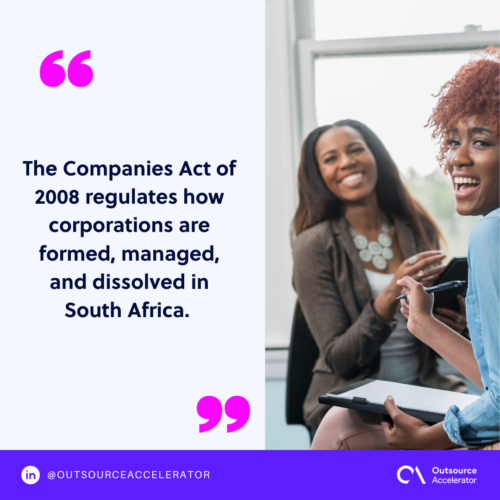How to start a corporation in South Africa

Starting a company in South Africa isn’t just about filling out forms; it’s about finding chances in a busy economy.
From beautiful scenery to an exciting business scene, South Africa invites business owners to join in.
But where to begin? Let’s explore the basics of getting through this process without any hitches.
What is a corporation?
A corporation is a recognized entity formed for business reasons. It’s separate from its owners (shareholders) and shields them from personal responsibility for the company’s debts.
The Companies Act of 2008 regulates how corporations are formed, managed, and dissolved in South Africa. It ensures compliance with the law and safeguards the interests of stakeholders.
According to Statista, in 2020, South Africa experienced a rise in new business formation. The country was recorded to have an increase of 1.8 new companies per 1,000 individuals, marking a 16.89% growth from 2019.
It reached 12.5 new companies per 1,000 individuals; the observed period recorded the highest density of new business formations.
The count of new businesses registered specifically pertains to the number of newly registered limited liability corporations or their equivalents within the calendar year.

Types of businesses in South Africa
In South Africa, the categories of businesses include:
Private company limited (Pty)
A company with shares limited to private ownership is often abbreviated as “Pty.” This type is its own legal entity and offers limited liability. It’s restricted in transferring shares and cannot offer shares to the public.
Public company
A public company is listed on the stock exchange and can offer shares to the public. It complies with more stringent regulatory requirements and offers shares for stock market trading.
State-owned company (SOC)
The government establishes a state-owned company to undertake commercial activities on its behalf. The state owns or controls these companies and operates in various sectors.
Non-profit company (NPC)
A non-profit company is created for charitable, religious, cultural, or social purposes. It operates without the intention of making profits for its members or shareholders.
Personal liability company (Inc.)
A Personal Liability Company (Inc.) is a business entity that offers its shareholders limited liability protection. This structure is unique as it protects against personal liability for the company’s debts or legal obligations.
External company
An external company is a foreign entity that builds a place of business in South Africa but is registered and governed by the laws of another country. It operates temporarily within South Africa’s jurisdiction.
Benefits of starting a corporation in South Africa
Starting a corporation in South Africa can offer several advantages, such as:
Limited liability
Establishing a corporation in South Africa offers the perk of limited liability. It safeguards personal assets from potential business debts.
This shields individual shareholders from being personally liable for the corporation’s legal obligations, providing a safety net for personal finances.
Access to markets
Starting a corporation opens doors to diverse markets within South Africa and globally. From busy cities to specific markets, it helps businesses reach different types of customers and discover many chances for success.
Tax incentives
South Africa extends a range of tax incentives to corporations, encouraging growth and investment.
These incentives often include tax breaks, credits, or exemptions, reducing the overall tax burden and stimulating economic development.
Government support
Corporations in South Africa benefit from government support programs and initiatives.
These support mechanisms range from funding opportunities to advisory services, fostering an environment conducive to business growth and development.
Skilled workforce
Starting a corporation in South Africa grants access to a diverse and skilled workforce. The country boasts a talent pool across various industries, providing businesses with ample resources to drive innovation and fuel growth.
9 compliance requirements in South Africa
Let’s explore the crucial compliance requirements when starting a corporation in South Africa:
1. Company registration
The first step toward establishing a corporation involves registering the company with the Companies and Intellectual Property Commission (CIPC).
This process grants legal recognition to your entity and sets the foundation for operations.

2. Tax compliance
Compliance with tax regulations is paramount. It involves registering for taxes applicable to your corporation, maintaining accurate records, and fulfilling tax obligations by South African tax laws.
3. Employment laws
Understanding and adhering to employment laws is vital for any firm. It entails compliance with labor regulations, employee rights, fair labor practices, and other legal aspects governing the employer-employee relationship.
4. B-BBEE compliance
The Broad-Based Black Economic Empowerment Act (B-BBEE) aims to foster economic inclusivity and transformation.
Businesses must comply with B-BBEE requirements, including initiatives promoting black economic participation and empowerment.
5. Financial reporting
Maintaining transparent and accurate financial records is a non-negotiable aspect of compliance. Corporations must adhere to specific reporting standards and guidelines to ensure financial transparency and accountability.
6. Data protection
Following the data protection laws is critical. Protecting sensitive information’s confidentiality, integrity, and security is mandatory under South African data protection regulations.
7. Competition laws
Compliance with competition laws is essential for fair business practices. Businesses must follow the law, avoid unfair practices, and ensure everyone has an equal chance in the market.
8. Industry-specific regulations
Different industries have specific regulations governing their operations.
Complying with these industry-specific requirements is crucial to ensure legal and operational adherence within a particular sector.
9. Environmental compliance
South Africa emphasizes environmental responsibility. Corporations must comply with environmental regulations, ensuring sustainable business practices and minimizing their ecological footprint.
How to start a corporation in South Africa in 2024
Starting a corporation in South Africa involves several steps. Here’s an outline of the process:
1. Choose a company name
Select a unique and available name that captures your business identity.
This name is the cornerstone of your brand, making a memorable first impression in the market and distinguishing your entity from others.
2. Register your company
Navigate the formalities of registering your company with the Companies and Intellectual Property Commission (CIPC).
This important step grants your corporation legal recognition, establishing it as a separate institution and ensuring compliance with regulatory requirements.
3. Appoint directors and incorporators
Appoint individuals as directors and incorporators who will guide the corporation’s direction. These individuals oversee operations, make strategic decisions, and ensure the corporation’s objectives are aligned.
4. Memorandum of incorporation (MOI)
Draft a comprehensive MOI outlining your corporation’s internal affairs rules, rights, and responsibilities.
This document is the guiding framework for decision-making processes and sets the structure for the corporation’s governance.
5. Register for tax
Registering your corporation for tax purposes with the South African Revenue Service (SARS) is crucial. Compliance with tax regulations is imperative for the corporation’s legitimacy and financial transparency.
6. Obtain necessary licenses and permits
Secure any licenses and permits required for your corporation’s industry or activities. Following legal rules and regulations sets the foundation for smooth business operations without interruptions.
7. Open a business bank account
Create a specific bank account for your business to keep personal and business finances separate. This separation streamlines financial management, enhances accounting transparency, and simplifies tax filings.
8. File required documents
Timely and accurate filing of all necessary documents with regulatory authorities is essential.
This includes submitting annual reports, financial statements, and other mandated filings to ensure regulatory compliance.
9. Compliance with labor laws
Strictly follow South Africa’s labor laws that oversee how employees are treated. Complying with these laws ensures fair treatment of employees and protects the corporation from legal liabilities.
10. Submit annual returns
Regularly submit accurate and updated annual returns to the CIPC. This practice maintains the corporation’s records, providing current information to regulatory bodies.
11. Keep records
Maintain meticulous records of all business transactions, contracts, and financial dealings. Organized record-keeping facilitates transparency, compliance, and informed decision-making within the firm
12. Compliance with corporate governance
Embrace and follow corporate governance principles. Foster honesty, responsibility, and ethical conduct in the company’s operations and decision-making.
13. Obtain B-BBEE certification (optional but recommended)
Consider pursuing Broad-Based Black Economic Empowerment (B-BBEE) certification. It demonstrates the corporation’s commitment to economic transformation and inclusivity, enhancing its credibility.
14. Seek legal and professional advice
Engage legal and professional advisors to navigate complex business regulations and mitigate risks associated with corporate operations.
Their guidance ensures compliance and minimizes legal liabilities.
How to start a corporation in South Africa: FAQs
Here are some frequently asked questions on establishing a corporation in South Africa:
Is my business in South Africa necessary to have a company secretary?
According to the Companies Act, No.71 of 2008, it’s mandated that every public and state-owned company must appoint a company secretary.

What amount of capital is needed to establish a company in South Africa?
You can start a company with minimal capital, but ensuring enough capital for initial operational expenses is essential.
Are there any limitations for entrepreneurs who aren’t residents when they incorporate in South Africa?
Entrepreneurs who aren’t residents can incorporate in South Africa without restrictions. Non-residents can establish businesses and own 100% of the company without local partners.
However, they must fulfill certain requirements, like appointing a local public officer or tax representative. Seeking advice from legal experts can clarify these aspects for non-resident entrepreneurs.
How can I open a business bank account?
To open a dedicated business account, visit a bank with the required documentation, including company registration documents.
Beginning a corporation in South Africa involves more than legal steps—it’s a journey full of chances and hurdles.
Embrace the adventure, navigate the compliance complexities, and see your corporation flourish in this dynamic country. Remember, every successful corporation starts with a carefully planned beginning.







 Independent
Independent




